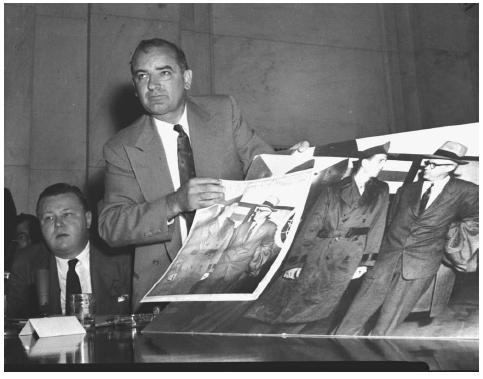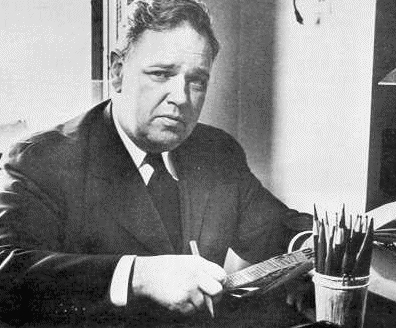Those who know American history also know that the push for a more socialist society is nothing new. Eugene Debs, the perennial presidential candidate for the Socialist Party during the early decades of the twentieth century received a rather impressive number of votes, especially in 1912. Franklin Roosevelt’s New Deal pushed us closer to the socialist vision with the rise of government oversight of the economy and Lyndon Johnson’s Great Society offered the kind of federal government intrusion that few would have predicted even during the New Deal.
So when you hear people speak fearfully of the current clamor for socialism that is found on the Left, please understand that this is nothing new.
But if all we do is react to the politics of socialism, we are missing the root of the problem. We need to focus elsewhere.

One of the seminal books of the twentieth century offers an inside look at the socialist/communist vision that has inspired so many. When I first read Witness in the mid-1980s, I was deeply impressed. Yes, it explained the historic events that occurred in the late 1940s when Whittaker Chambers fingered Alger Hiss (a top State Department official during FDR’s presidency) as a member of the underground communist conspiracy. Chambers knew about Hiss because they had worked in that underground together. Chambers, though, escaped that ideology and sought to alert America to the dangers it brought if they weren’t diligent to actively work against it.
Yet that basic story, important as it is, wasn’t the most impressive thing about the book. What truly captured my mind was the heartfelt nature of the witness Chambers offered. This was no mere political tract; it was not a piece of propaganda to ensure the right people were elected. No, it went deeper. It pierced the darkness of the political movement known as socialism/communism and exposed the worse darkness that gave birth to it.

In the foreword to Witness, Chambers describes the communist vision as nothing new. He calls it man’s second oldest faith originating in the Garden of Eden when the first humans were promised that they would be as gods when they had the knowledge of good and evil. “The Communist vision,” Chambers explains, “is the vision of Man without God. It is the vision of man’s mind displacing God as the creative intelligence of the world. It is the vision of man’s liberated mind, by the sole force of its rational intelligence, redirecting man’s destiny and reorganizing man’s life and the world.” Further, he states,
It has posed in practical form the most revolutionary question in history: God or Man? It has taken the logical next step which three hundred years of rationalism hesitated to take, and said what millions of modern minds think, but do not dare or care to say: If man’s mind is the decisive force in the world, what need is there for God? . . .
Communism is what happens when, in the name of Mind, men free themselves from God. But its view of God, its knowledge of God, its experience of God, is what alone gives character to a society or a nation, and meaning to its destiny. . . .
There has never been a society or a nation without God. But history is cluttered with the wreckage of nations that became indifferent to God, and died.
Socialism/communism are not the primary problem. They are merely the symptoms. Chambers understood that. Even though he was testifying to specific deeds done in the name of a political movement, his message was much deeper. In fact, after writing Witness, the letters he wrote to friends reveal that he was in despair at times over how little people understood about what he was trying to communicate. They would concentrate on the politics and not the underlying issue of the exaltation of man over God. They weren’t interested in the root of the problem.

When Republican senator Joe McCarthy jumped on the anti-communist bandwagon after Chambers’s revelations, Chambers was wary of what McCarthy might do. Was he a man who really understood the root of the problem or was he merely using people’s fears for his own political advantage? Chambers ultimately decided to avoid any direct connection with the senator. In his analysis of McCarthy’s tactics, Chambers wrote to his friend Ralph de Toledano, “Senator McCarthy’s notion of tactics is to break the rules, saturate the enemy with poison gas, and then charge through the contaminated area, shouting Comanche war cries.” Writing to publisher Henry Regnery, he commented,
What is worse, he has to learn from consequences or counselors that he has fouled. I know he thinks this is a superior technique that the rest of us are too far behind to appreciate. But it is repetitious and unartful, and, with time, the repeated dull thud of the low blow may prove to be the real factor in his undoing. Not necessarily because the blow is low, or because he lacks heart and purpose, but because he lacks variety, and, in the end, simply puts the audience to sleep. . . .
I said long since that the crucial question about Senator McCarthy was not whether his aims are ultimately good or bad, but whether his intelligence is equal to his energy.
Chambers’s insight on how McCarthy’s tactics lacked variety is particularly poignant in our present circumstances. I see and hear countless conservatives (or those who at least think they are conservatives) carrying out McCarthy’s tactics. After a while, they have nothing new to say; they just keep repeating the same old tired refrains. There is little intelligence displayed.

Chambers summarized his concern about McCarthy in a letter to William F. Buckley: “In fact, it is no exaggeration to say that we live in terror that Senator McCarthy will one day make some irreparable blunder which will play directly into the hands of our common enemy and discredit the whole anti-Communist effort for a long while to come.” That prediction came true, McCarthy fell into well-deserved disrepute, and the Left ever since has gleefully used the term “McCarthyism” to downplay the socialist tide. Sadly, conservatives have often repeated the McCarthyite tactics and have set themselves up not to be taken seriously.
Chambers was dismayed by the socialist/communist threat, certainly. Yet he was perhaps even more dismayed by those who should have known better what the real problem was: the heart of man and the displacement of God. Western civilization, Chambers told Buckley, may not have succumbed to complete socialism, but it had, in many ways, conformed itself to the philosophy behind it. “The enemy—he is ourselves. That is why it is idle to talk about preventing the wreck of Western civilization. It is already a wreck from within.”

Most readers missed the point about Witness, he confided to Buckley: “[The world] seems to suppose that I said: ‘Destroy Communism and you can go back to business as usual.’ Of course, what I really said was: ‘This struggle is universal and mortal, and only by means of it, on condition that you are willing to die that your faith may live, can you conceivably recover the greatness which is in the souls of men.'” But didn’t the majority believe Chambers about Hiss? Why should he despair? It came back to the bigger picture, and Chambers felt that too few saw that bigger picture. One of his letters to Toledano stands out as a cry from the heart in a way that few others do. The despair and pessimism seem to reach a crescendo when he writes,
I pass hours of bitterness which can only be called crippling. . . .
It’s the realization . . . that this side [conservatives] is in its plight because of its stupidity, and cannot get out of it because of its stupidity, and cannot help anybody . . . because of its stupidity—it’s that that’s killing us.
And the stupidity of well-meaning friends is far more destructive than the malicious mischief of outright enemies. When you have to face the fact that they cannot, simply are unable, to act like grown ups, then you know that it’s hopeless and all that we have tried to do is for nothing.
Why am I spending time on this subject? Perhaps it’s because I look around at what passes for conservatism today and want to echo what Chambers said about the loss of understanding of the real problem. Perhaps it’s because most of what I see is simply an angry reaction to the politics of the Left and not a genuine answer to the basic philosophic issue behind the false ideology. Perhaps I am distraught and dismayed by the stupidity of what I see—the loss of principle, the willingness to cast aside constitutional safeguards and become replicas of Joe McCarthy.
If conservatives do that, the result will be no different than what happened to Senator McCarthy. We will be in disrepute (rightly) and will have nothing worthwhile to offer to the political discussion. We also will be guilty of making politics the center of our being and moving the spiritual to a secondary role.
My fear is that that is the path we are on.
